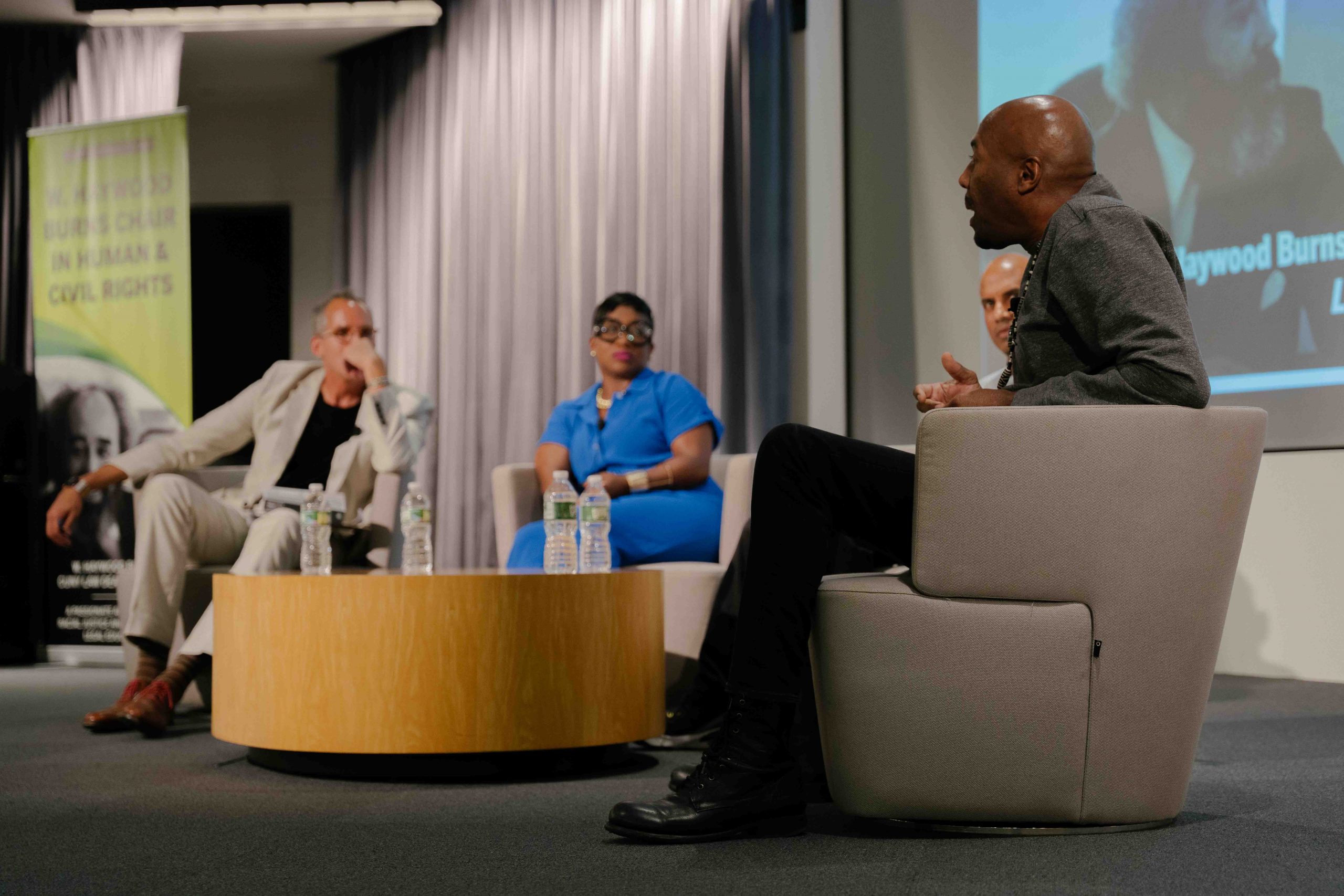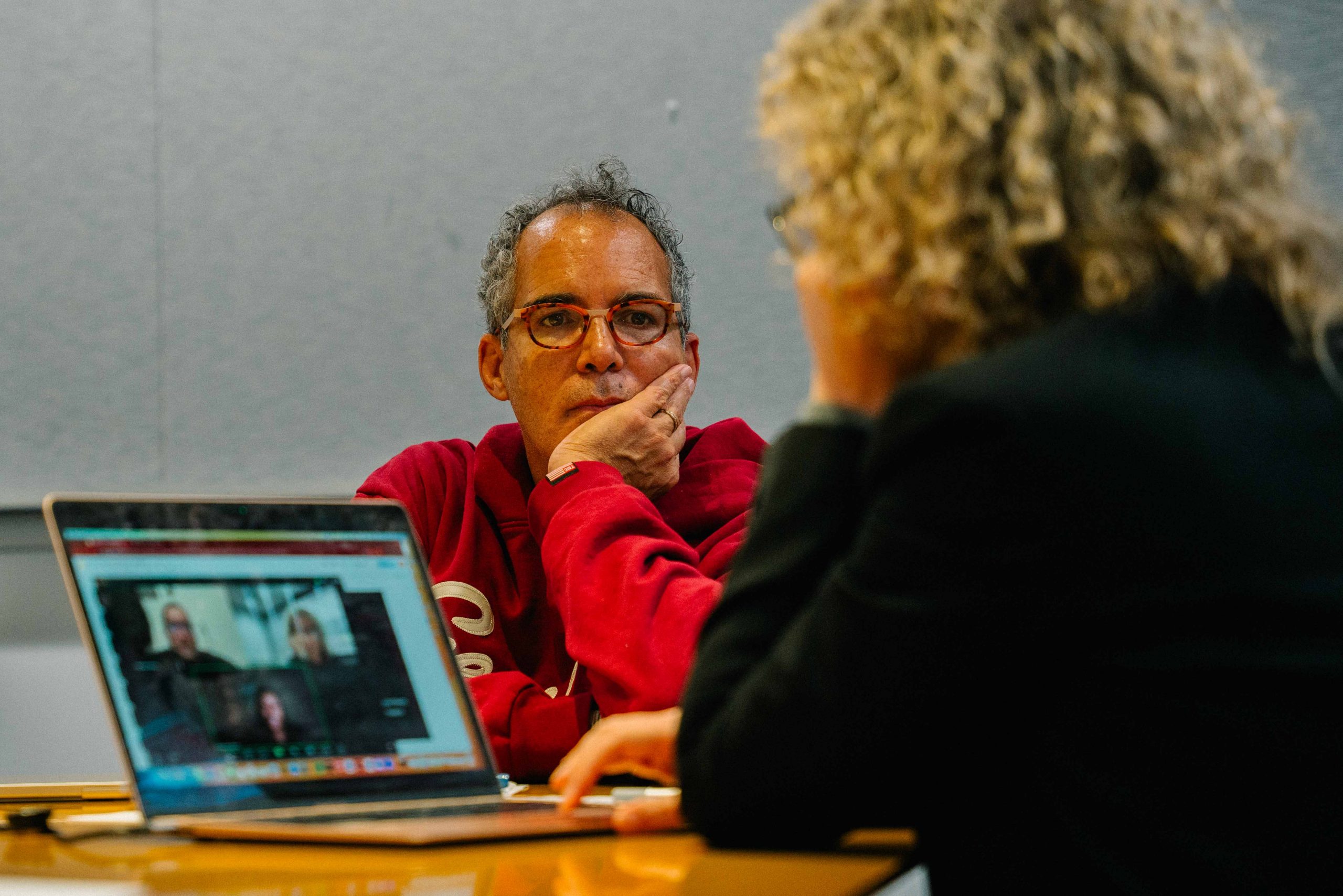“You need to come into the case with conviction, with belief, with passion. You need to make the room believe that justice matters. And you need the confidence to carry this work and sustain it over a career. The job is to represent the people.”
That spirit shaped Professor James Forman Jr.’s year as the 2025 W. Haywood Burns Chair in Human & Civil Rights at CUNY School of Law, from the public dialogues he led in the fall to the deeply immersive trial advocacy course he taught in the spring. A Pulitzer Prize-winning author, Yale Law professor, and former public defender, Professor Forman brought not only national stature to CUNY Law, but a profound commitment to rooting the teaching of litigation not only in moral clarity, technical skill, and professional identity.
Throughout the fall semester, Professor Forman hosted a series of public events that brought together experts and allies from across the social justice landscape to examine the role of law in confronting structural injustice in the criminal legal system.
In his first event as Burns Chair, Professor Forman explored how criminal justice advocates, including those who were once incarcerated themselves, fought to make our prisons less destructive and to increase opportunity for people leaving prison. Two leaders, R. Dwayne Betts a lawyer and poet, and Cassandra Cean-Owens, Director of the REFORM Advocacy Institute at REFORM Alliance, joined him in conversation, which you can experience at the link.
In October, discussion focused on Professor Forman’s co-edited anthology, Dismantling Mass Incarceration: A Handbook for Change. This event brought together a panel of practitioners and scholars, including Paul Butler, the Albert Brick Professor of Law at Georgetown University Law Center; Raj Jayadev, co-founder of Silicon Valley De-Bug, and Heather Pinckney, Director of the Public Defender Service for the District of Columbia, to explore the crucial role of public defenders within the criminal legal system, available online to watch and hear.

In November, he hosted a panel entitled Rolling Back New York’s Excessive Sentencing, available to watch at the link, where conversation underscored the urgent need for collaboration across sectors to ensure justice and equity in sentencing policies. By highlighting New York’s forward-thinking initiatives, the event served as a call to action for stakeholders nationwide to champion reforms that offer meaningful second chances to individuals and communities affected by the criminal justice system.
These convenings, organized as part of the Burns Chair’s public engagement mission, drew students, faculty, alumni, and community partners into critical conversation about civil rights, racial justice, and the future of the legal profession.
They also laid the groundwork for a rigorous, personally transformative spring semester in the classroom.
In the spring, Professor Forman worked closely with a small cohort of students to build the courtroom skills, strategic thinking, and presence required of trial lawyers. But the class was never just about craft. “We get a chance throughout the semester to really probe—what is doing justice?”
He brought the same rigor to questions posed to students: “You’ll be working in a system where you’re often underfunded and you’re almost always overworked and your clients may meet you and they think they didn’t get the best lawyer. Your job is to prove to them and to show them that you are going to be a zealous advocate. How are you going to accomplish this?”

That complexity—of role, of responsibility, of emotion—surfaced often in class. “Being a trial lawyer, you don’t have control of everything that’s going to happen,” Professor Forman told students. “But how do you use that stress to your advantage so that you’re right on that edge… and you show the jury that you care passionately about the issue in this trial?”
As the semester culminated in mock trials, one moment stood out for Professor Forman. “My favorite moment is seeing a student who has been nervous all semester, who has said, I don’t think I’m going to be good at this… and then you see that student stand up and look at the jury for the first time, look the jury in the eye, and start to deliver their opening statement. And you can see them gaining confidence as they go… They now know they’ve learned that they can do the thing that they doubted they could ever do.”
Those moments, Professor Forman said, weren’t rare. In one mock trial, a student opened by grounding the law in lived experience. “She said, ‘I’m an immigrant and I’m an immigrant from a family of immigrants, and we came to this country in part because of the rule of law, because of what this country stood for.’ In her home country, she explained, there’s no expectation that everyone is treated fairly in a courtroom. But there is in this country.”
One thing unique to teaching CUNY Law students, Professor Forman noted, is that “Wherever the students come from, they bring that experience. They bring their hometown, they bring their parents and their grandparents and the dreams of their parents and grandparents with them into the classroom.”
Professor Forman is candid about the urgency of this work. “At this moment in the country right now, our legal system and our commitment to the rule of law are under threat. It’s under attack in the news every day.” And yet, what he found at CUNY Law was not disillusionment, but resolve. “Teaching this generation of CUNY Law students—who come into this law school believing that the law is supposed to stand for something, something bigger than any of us individually… that’s fundamentally the thing that we’ve been doing all semester.”
That belief, that the law must be a tool for liberation, is central to the legacy of the W. Haywood Burns Chair in Human & Civil Rights. Established to honor the visionary civil rights lawyer and former CUNY Law dean, the Chair brings leading thinkers and advocates to campus each year to challenge, inspire, and teach.
